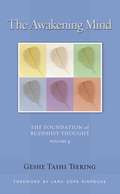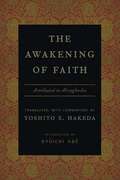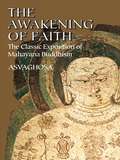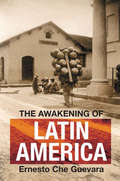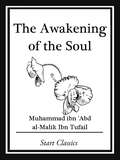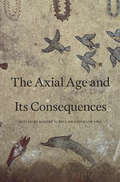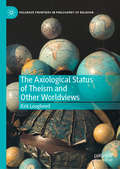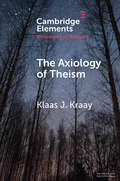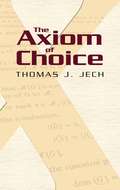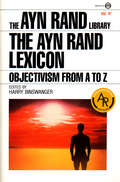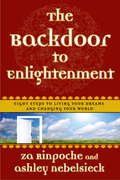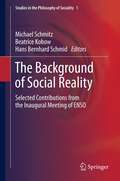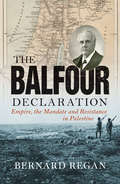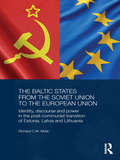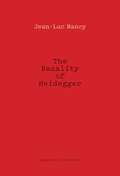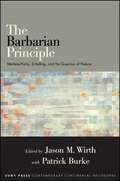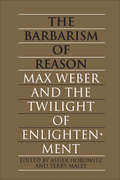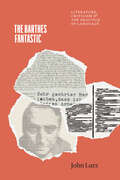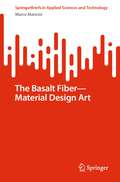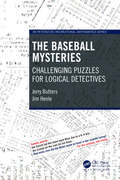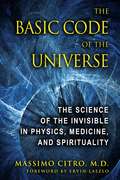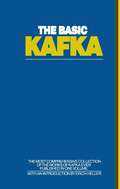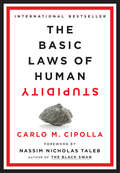- Table View
- List View
The Awakening Mind
by Lama Thubten Zopa Rinpoche Geshe Tashi Tsering Gordon McdougallBodhichitta, often translated as "great compassion," is the gem at the heart of Buddhism. From this altruistic desire to serve others, all other Buddhist practices naturally flow, therefore, this state of mind is one Buddhists should understand and cultivate. In The Awakening Mind, Geshe Tashi Tsering leads us through the two main methods to develop bodhichitta that have been developed by the great Indian and Tibetan Buddhists over the centuries: the seven points of cause and effect, and equalizing and exchanging the self with others. This is the fourth release from Geshe Tashi's Foundation of Buddhist Thought series, which individually and collectively represent an excellent introduction to Tibetan Buddhism. These unique and friendly books are based on the curriculum of a popular course of the same name, developed by Geshe Tashi himself. Geshe Tashi's presentations combine rigor and comprehensiveness with lucidity and accessibility, never divorced from the basic humanity and warmth of his personality. In Geshe Tashi, we encounter the new generation of Tibetan monk-scholars teaching in the West who are following in the footsteps of such revered and groundbreaking teachers as Geshe Wangyal and Geshe Sopa.
The Awakening of Faith: Attributed to Asvaghosha (Translations from the Asian Classics)
by Yoshito HakedaYoshito S. Hakeda's critical interpretation of the "Awakening of Faith" has become a classic. This edition, which includes a new introduction by Ryuichi Abe, presents a beautiful and accessible translation of one of the most influential works in Mahayana Buddhism. <p><p> "The Awakening of Faith" explores the path leading to enlightenment and teaches the principles and methods of meditation. However, the text does not advocate a passive retreat into the quietude of meditation; instead it calls for dynamic social engagement based on compassion and wisdom. Philosophical and religious in its approach, the "Awakening of Faith" provides a comprehensive summary of the essentials of Mahayana Buddhism. <p><p> "The Awakening of Faith", commonly attributed to Asvaghosha, has been read and studied for more than a thousand years. Hakeda's interpretive comments, which have influenced a generation of scholars and readers, illuminate and explain the work and its more esoteric elements. Ryuichi Abe's introduction examines the importance of Hakeda's translation as well as the place of the Awakening of Faith within Buddhism. In this reprint edition, Chinese terms are rendered in Pinyin romanization. Also new to this edition are a Chinese character glossary and a vastly expanded index, which identify and cross-reference both major and minor theoretical terms and concepts throughout the work.
The Awakening of Faith: The Classic Exposition of Mahayana Buddhism
by Teitaro Suzuki AsvaghosaComprehensive and coherent, this guide to a complex system of Buddhism is so authoritative that it has been employed in the instruction of Buddhist priests. Readers will find that it offers the keys to the essentials of Mahayana Buddhism, a liberal and theistic branch of the faith practiced chiefly in China and Japan.Translated by the distinguished scholar Teitaro Suzuki, the text discusses how humans can transcend their finite state to partake in the life of the infinite. Practices and techniques to assist believers in the awakening and growth of faith appear here, in addition to the most developed form of tathagata-garbha, or Buddha-matrix teachings.This accessible work was written specifically for those who prefer a brief and pithy presentation to extensive discourse.
The Awakening of Latin America
by Ernesto Che Guevara María del Ariet GarcíaThe name Che Guevara is synonymous with Latin America. This classic anthology on Latin America shows the Argentine-born revolutionary's cultural depth, rigorous intellect and intense emotional engagement with a continent and its people.Selected from his family's personal archives, this book offers the best of Che's writing: examples of his journalism, essays, speeches, letters and even his poetry, revealing the evolution of an extraordinary mind from that of an impressionable young medical student to the "heroic guerrilla," brutally assassinated in Bolivia. This anthology of Che Guevara's writing on Latin America is destined to become an instant classic comparable to Eduardo Galeano's Open Veins of Latin America."I consider my country to be not only Argentina but the entire Americas."-Ernesto Che Guevara
The Awakening of the Soul
by Muhammad ibn 'Abd al-Malik Ibn TurailIt is to two English scholars, father and son, Edward Pococke, senior and junior, that the world is indebted for the knowledge of one of the most charming productions Arabian philosophy can boast of. Generally looked upon as a subject of repulsive aridity, in its strange combination of the most heterogeneous philosophical systems, devoid of the grace and charm of attractive style, unbrightened by brilliancy of wit or spirit, Arabian philosophy has, for centuries past, been subject to sad and undeserved neglect. Yet I cannot imagine a better and more eloquent refutation of this erroneous view than a rendering, in fresh garb, of this romance of Hayy Ibn Yokdhan, simple and ingenuous, yet fragrant with poetry and withal fraught with deep philosophical problems the interest in which I wish to revive. It was in the year 1671 that there was published by the Oxford University Press, as one of its first issues of Arabic texts, a book called, "Philosophus autodidactus," edited by Edward Pococke the son, together with a Latin translation. It had a preface that bore the signature of Edward Pococke, the father, and this fact alone was sufficient to stamp it at once as a work in which vast erudition and thoroughness of investigation had joined hands--for both these savants were men of wide reputation and brilliant attainments.
The Axial Age and Its Consequences
by Robert N. Bellah Hans JoasThe first classics in human historyâthe early works of literature, philosophy, and theology to which we have returned throughout the agesâappeared in the middle centuries of the first millennium bce. The canonical texts of the Hebrew scriptures, the philosophical writings of Plato and Aristotle, the Analects of Confucius and the Daodejing, the Bhagavad Gita and the teachings of the Buddhaâall of these works came down to us from the compressed period of history that Karl Jaspers memorably named the Axial Age. In The Axial Age and Its Consequences, Robert Bellah and Hans Joas make the bold claim that intellectual sophistication itself was born worldwide during this critical time. Across Eurasia, a new self-reflective attitude toward human existence emerged, and with it an awakening to the concept of transcendence. From Axial Age thinkers we inherited a sense of the world as a place not just to experience but to investigate, envision, and alter through human thought and action. Bellah and Joas have assembled diverse scholars to guide us through this astonishing efflorescence of religious and philosophical creativity. As they explore the varieties of theorizing that arose during the period, they consider how these in turn led to utopian visions that brought with them the possibility of both societal reform and repression. The roots of our continuing discourse on religion, secularization, inequality, education, and the environment all lie in Axial Age developments. Understanding this transitional era, the authors contend, is not just an academic project but a humanistic endeavor.
The Axiological Status of Theism and Other Worldviews (Palgrave Frontiers in Philosophy of Religion)
by Kirk LougheedThis book explores the value impact that theist and other worldviews have on our world and its inhabitants. Providing an extended defense of anti-theism - the view that God’s existence would (or does) actually make the world worse in certain respects - Lougheed explores God’s impact on a broad range of concepts including privacy, understanding, dignity, and sacrifice. The second half of the book is dedicated to the expansion of the current debate beyond monotheism and naturalism, providing an analysis of the axiological status of other worldviews such as pantheism, ultimism, and Buddhism. A lucid exploration of contemporary and relevant questions about the value impact of God’s existence, this book is an invaluable resource for scholars interested in axiological questions in the philosophy of religion.
The Axiology of Theism (Elements in the Philosophy of Religion)
by Klaas J. KraayTheism is the view that God exists; naturalism is the view that there are no supernatural beings, processes, mechanisms, or forces. This Element explores whether things are better, worse, or neither on theism relative to naturalism. It introduces readers to the central philosophical issues that bear on this question, and it distinguishes a wide range of ways it can be answered. It critically examines four views, three of which hold (in various ways) that things are better on theism than on naturalism, and one of which holds just the opposite.
The Axiom of Choice
by Thomas J. JechComprehensive in its selection of topics and results, this self-contained text examines the relative strengths and consequences of the axiom of choice. Each chapter contains several problems, graded according to difficulty, and concludes with some historical remarks.An introduction to the use of the axiom of choice is followed by explorations of consistency, permutation models, and independence. Subsequent chapters examine embedding theorems, models with finite supports, weaker versions of the axiom, and nontransferable statements. The final sections consider mathematics without choice, cardinal numbers in set theory without choice, and properties that contradict the axiom of choice, including the axiom of determinacy and related topics
The Ayn Rand Lexicon
by Ayn Rand Harry BinswangerA prolific writer, bestselling novelist, and world-renowned philosopher, Ayn Rand defined a full system of thought--from epistemology to aesthetics. Her writing is so extensive and the range of issues she covers so enormous that those interested in finding her discussions of a given topic may have to search through many sources to locate the relevant passage. The Ayn Rand Lexicon brings together all the key ideas of her philosophy of Objectivism. Begun under Rand's supervision, this unique volume is an invaluable guide to her philosophy or reason, self-interest and laissez-faire capitalism--the philosophy so brilliantly dramatized in her novels The Fountainhead, We the Living, and Anthem.
The Ayurvedic Reset Diet: Radiant Health through Fasting, Mono-Diet, and Smart Food Combining
by Vatsala SperlingA step-by-step guide to Ayurvedic dietary resets to gently cleanse your digestive system and reboot your body and mind • Presents easy-to-follow instructions for a full 6- or 8-week Ayurvedic reset diet, as well as a simplified 1-week plan, detailing what to eat and drink day by day • Includes recipes, mindful eating tips, and meal prepping techniques • Explains the healing science of Ayurveda, the rejuvenating benefits of fasting and mono-diets, and how to maximize nutrient absorption with food combining Food sensitivities, chronic inflammation, obesity, and chronic disease are on the rise. Could our modern diets and mindless eating habits be to blame? How do you reboot your system--body, mind, and spirit--and start the path to radiant health? In this easy-to-follow guide to Ayurvedic dietary resets, Vatsala Sperling, Ph.D., details how to rest and gently cleanse your digestive system, lose extra pounds, and reboot your body and mind with the Ayurvedic techniques of fasting, mono-diets, and food combining. She begins by sharing a simplified introduction to the healing science of Ayurveda from India and explains the spiritual, mindful relationship to food at its heart. Offering step-by-step instructions for a full 6- or 8-week Ayurvedic reset diet, as well as a simplified 1-week program, she details, day by day, what to eat and drink and provides recipes and meal prepping tips and techniques. The author explains how to prepare for fasting and the benefits of giving your digestive system a break from food, even if only for one day. She prepares you for mono-dieting--when you eat one type of food such as fruits or vegetables for a set period--and reveals the rejuvenating effects that come from isolating your daily diet to one food type. The author then explores the Ayurvedic techniques of food combining in detail, explaining exactly what to eat when to maximize nutrient absorption. Based on the ancient wisdom of Ayurveda, this guide provides everything you need to know to heal your digestive system, prevent chronic ailments, find your healthy weight, and rebuild your sacred relationship with food.
The Backdoor to Enlightenment
by Za Rinpoche Ashley NebelsieckEveryone dreams of a better life. All the things you’ve ever wanted — happiness, loving relationships, well-being, abundance, and peace of mind — are all qualities of enlightenment, a way of embracing our fullest potential that seemed unavailable to us, until now. For thousands of years, the secret to enlightenment has remained hidden in the distant reaches of the Himalayas, deep in wisdom impenetrable to all but the most dedicated seekers. For the first time in history,The Backdoor to Enlightenmentburns the rules and barriers that have hindered our understanding and reveals the keys to immediate, profound realization to the rest of the world. Blending centuries-old texts with contemporary wisdom, readers of any faith can bypass the traps and limitations of modern life and achieve lasting peace every day. More than just a heartfelt story of mystery and discovery, this revolutionary work stands out as a smart, clear guide, showing step-by-step how you can use these astonishing truths to transform every aspect of your life. There might not be a shortcut to your dreams, but there is a Backdoor!
The Background of Social Reality: Selected Contributions from the Inaugural Meeting of ENSO
by Michael Schmitz Hans Bernhard Schmid Beatrice KobowThis volume aims at giving the reader an overview over the most recent theoretical and methodological findings in a new and rapidly evolving area of current theory of society: social ontology. This book brings together philosophical, sociological and psychological approaches and advances the theory towards a solution of contemporary problems of society, such as the integration of cultures, the nature of constitutive rules, and the actions of institutional actors. It focuses on the question of the background of action in society and illuminates one of the most controversial, cross-disciplinary questions of the field while providing insight into the ontological structure of groups as agents. This volume offers an interesting and important contribution to the debate as it does well in bridging the gap between the analytical and the continental tradition in social philosophy. In addition, this volume expands the reach and depth of the philosophy of sociality by relating it to philosophical ideas from the late 19th and early 20th centuries and to key thinkers such as Husserl, Heidegger, and Bourdieu. The contributors include internationally renowned scholars as well as a highly selected set of younger scholars whose work is at the cutting edge of their field. Scholarly, yet accessible, this book is an essential resource for researchers across the social sciences.
The Balfour Declaration: Empire, the Mandate and Resistance in Palestine
by Bernard ReganThe true history of the imperial deal that transformed the Middle East and sealed the fate of PalestineOn November 2, 1917, the British government, represented by Foreign Minister Arthur Balfour, declared that they were in favor of “the establishment in Palestine of a national home for the Jewish people.” This short note would be one of the most controversial documents of its time.A hundred years after its signing, Bernard Regan recasts the history of the Balfour Declaration as one of the major events in the story of the Middle East. Offering new insights into the imperial rivalries between Britain, Germany and the Ottomans, Regan exposes British policy in the region as part of a larger geopolitical game. Yet, even then, the course of events was not straightforward and Regan charts the debates within the British government and the Zionist movement itself on the future of Palestine.The book also provides a revealing account of life in Palestinian society at the time, paying particular attention to the responses of Palestinian civil society to the imperial machinations that threatened their way of life. Not just a history of states and policies, Regan manages to brilliantly present both a history of people under colonialism and an account of the colonizers themselves.
The Baltic States from the Soviet Union to the European Union: Identity, Discourse and Power in the Post-Communist Transition of Estonia, Latvia and Lithuania (BASEES/Routledge Series on Russian and East European Studies)
by Richard MoleThe Baltic States are unique in being the only member-states of the EU to have fought to regain their sovereignty from the Soviet Union, only then to cede it to Brussels in certain key areas. Similarly, no member-states have had to struggle as hard as Estonia, Latvia and Lithuania to preserve their identity after fifty years of Soviet nationality policy in the face of sub-state and supra-state challenges. The post-communist experience of the Baltic States thus allows us to examine debates about identity as a source of political power; the conditioning and constraining influence of identity discourses on social, political and economic change; and the orientation and outcome of their external relations. In particular, the book examines the impact of Russian and Soviet control of Estonia, Latvia and Lithuania; the Baltic independence movements of the late 1980s/early 1990s; the citizenship debates; relations with Russia vis-à-vis the withdrawal of the troops of the former Soviet Army; drawing of the shared boundary and the rights of Russian-speaking minorities as well as the efforts undertaken by the three Baltic States to rebuild themselves, modernise their economies, cope with the ensuing social changes and facilitate their accession to the EU and NATO.
The Banality of Heidegger
by Jean-Luc NancyHeidegger and Nazism: Ever since the philosopher’s public involvement in state politics in 1933, his name has necessarily been a part of this unsavory couple. After the publication in 2014 of the private Black Notebooks, it is now unambiguously part of another: Heidegger and anti-Semitism.What do we learn from analyzing the anti-Semitism of these private writings, together with its sources and grounds, not only for Heidegger’s thought, but for the history of the West in which this thought is embedded? Jean-Luc Nancy poses these questions with the depth and rigor we would expect from him. In doing so, he does not go lightly on Heidegger, in whom he finds a philosophical and “historial” anti-Semitism, outlining a clash of “peoples” that must at all costs arrive at “another beginning.” If Heidegger’s uncritical acceptance of prejudices and long-debunked myths about “world Jewry” shares in the “banality” evoked by Hannah Arendt, this does nothing to lessen the charge. Nancy’s purpose, however, is not simply to condemn Heidegger but rather to invite us to think something to which the thinker of being remained blind: anti-Semitism as a self-hatred haunting the history of the West—and of Christianity in its drive toward an auto-foundation that would leave behind its origins in Judaism.
The Barbarian Principle: Merleau-Ponty, Schelling, and the Question of Nature (SUNY series in Contemporary Continental Philosophy)
by Jason M. Wirth; Patrick BurkeToward the end of his life, Maurice Merleau-Ponty made a striking retrieval of F. W. J. Schelling's philosophy of nature. The Barbarian Principle explores the relationship between these two thinkers on this topic, opening up a dialogue with contemporary philosophical and ecological significance that will be of special interest to philosophers working in phenomenology and German idealism.
The Barbarism of Reason: Max Weber and the Twilight of Enlightenment
by Terry Maley Asher HorowitzThe recent renewal of interest in Max Weber evidences an attempt to enlist his thought in the service of a renewed dream of Enlightenment individualism. Yet he was the first twentieth-century thinker to fully appreciate the pervasiveness and ambiguity of rationalization which threatened to undermine the hopes of the Enlightenment. Asher Horowitz and Terry Maley present a collection of essays tracing the contemporary significance of Weber's work for the tradition of Enlightenment political thought and its critiques. In its critical inquiry into Weber's thought, The Barbarism of Reason continues the exploration of the limits and prospects of politics in a rationalizing society. The first section comprises a set of both historical and philosophical reflections on the political implications of Weber's central concepts such as disenchantment, rationality, and affectivity, the historical understanding, meaning, and domination. The second section examines the institutional and historical context that framed Weber's inquiries into structures of the modern mode of domination, as well as his understanding of the nature of the modern state. Among the topics broached are Weber's strategic intervention into the development of the liberal theory of the state as well as a critical examination of the theoretical and pre-theoretical roots of his construction of the subject. Another of the essays reveals the schizophrenic structure of modern subjectivity. The third and last section attempts to trace the vicissitudes of Weber's seminal problems concerning rationalization, power, and disenchantment through some of the most important responses to his work in the twentieth century.
The Barthes Fantastic: Literature, Criticism, and the Practice of Language (Thinking Literature)
by John LurzThis study of the writing of Roland Barthes breaks down the divide between lived experience and the language of a literary work. In The Barthes Fantastic, John Lurz explores the intersection of literature and everyday life—and confronts some habits of literary study—through a reading of the work of Roland Barthes. An influential French theorist, Barthes wrote prolifically on the place of language and the play of signs in the ways we produce cultural and aesthetic meaning. Ranging across the entire sweep of Barthes’s varied career, Lurz shows how Barthes’s insights into signification and literature involve particular intellectual activities that impart significance to the world. Doing so allows him to develop an expanded understanding of the fantastic as a conceptual category—a way of thinking—in which the texts we read come to inform the texture of our real lives. Ultimately, The Barthes Fantastic enlarges our sense of what we learn as students of literature and gives us a new picture of a writer we thought we knew.
The Basalt Fiber—Material Design Art (SpringerBriefs in Applied Sciences and Technology)
by Marco ManciniThis book presents a design research on the basalt fiber, a natural mineral material with important characteristics, and investigates the material's properties, production techniques, and most common uses, while also delving into aspects yet to be improved. The work presents a part of original research in between art and design, in which concepts, prototypes, and ideas are proposed, aimed at the enhancement of basalt fiber also from an esthetic point of view and not only from a performance one. By working on its perceived qualities and creative and formal potential, it is possible to support and extend the use of this material in many areas of design, including product, exhibit, cultural industries, and fashion. Considering that environmental regulations are increasingly stringent, the use of basalt fiber may in some cases be more advantageous than other popular technical fibers, both because of its own performance characteristics and specifically because of its inherent sustainability.
The Baseball Mysteries: Challenging Puzzles for Logical Detectives (AK Peters/CRC Recreational Mathematics Series)
by Jim Henle Jerry ButtersThe Baseball Mysteries: Challenging Puzzles for Logical Detectives is a book of baseball puzzles, logical baseball puzzles. To jump in, all you need is logic and a casual fan’s knowledge of the game. The puzzles are solved by reasoning from the rules of the game and a few facts.The logic in the puzzles is like legal reasoning. A solution must argue from evidence (the facts) and law (the rules). Unlike legal arguments, however, a solution must reach an unassailable conclusion.There are many puzzle books. But there’s nothing remotely like this book. The puzzles here, while rigorously deductive, are firmly attached to actual events, to struggles that are reported in the papers every day.The puzzles offer a unique and scintillating connection between abstract logic and gritty reality.Actually, this book offers the reader an unlimited number of puzzles. Once you’ve solved a few of the challenges here, every boxscore you see in the papers or online is a new puzzle! It can be anywhere from simple, to complex, to impossible. For anyone who enjoys logical puzzles For anyone interested in legal reasoning For anyone who loves the game of baseball
The Basic Code of the Universe: The Science of the Invisible in Physics, Medicine, and Spirituality
by Ervin Laszlo Massimo CitroExplains the universal information code connecting every person, plant, animal, and mineral and its applications in science, health care, and cosmic unity • Examines research on consciousness, quantum physics, animal and plant intelligence, emotional fields, Kirlian photography, and the effects of thoughts, emotions, and music on water • Reveals the connections between the work of Ervin Laszlo on the Akashic field, Rupert Sheldrake on morphogenetic fields, Richard Gerber on vibrational medicine, and Masaru Emoto on the memory of water DNA dictates the physical features of an organism. But what dictates how something grows--from the division of cells in a human being to the fractal patterns of a crystal? Massimo Citro reveals that behind the complex world of Nature lies a basic code, a universal information field--also known as the Akashic field, which records all that was, is, and will be--that directs not only physical development and behavior but also energetic communication and interactions among all living and non-living things. The author examines research on consciousness, quantum physics, animal and plant intelligence, the power of intention, emotional fields, Kirlian photography, and the effects of thoughts, emotions, and music on water. Linking the work of Ervin Laszlo on the Akashic field, Rupert Sheldrake on morphogenetic fields, Richard Gerber on vibrational medicine, and Masaru Emoto on the memory of water, Citro shows how the universal information field connects every person, plant, animal, and mineral--a concept long known by shamans and expounded by perennial wisdom. Putting this science of the invisible to practical use, he explains his revolutionary system of vibrational medicine, known as TFF, which uses the information field to obtain the benefits of natural substances and medications in their “pure” informational form, offering side-effect-free remedies for health and well-being.
The Basic Kafka
by Franz Kafka Erich HellerOne of the most important authors of the 20th century, Franz Kafka was a man who lived fully through his work, who attacked with stunning craft and powerful vision the bureaucratic world he hated. Now, published together for the first time, here are selections from all of Katka's writings: his longer pieces ("The Metamorphosis;' "Josephine the Singer"), his short stories, parables and his personal diaries and letters. This collection stands as the most complete picture of Kafka over shown, as one of the most influential writers-and complex men-of our time.
The Basic Laws of Human Stupidity: The International Bestseller
by Carlo M. Cipolla"A masterly book" —Nassim Nicholas Taleb, author of The Black Swan "A classic" —Simon Kuper, Financial Times An economist explains five laws that confirm our worst fears: stupid people can and do rule the worldThroughout history, a powerful force has hindered the growth of human welfare and happiness. It is more powerful than the Mafia or the military. It has global catastrophic effects and can be found anywhere from the world's most powerful boardrooms to your local bar. It is human stupidity. Carlo M. Cipolla, noted professor of economic history at the UC Berkeley, created this vitally important book in order to detect and neutralize its threat. Both hilarious and dead serious, it will leave you better equipped to confront political realities, unreasonable colleagues, or your next dinner with your in-laws. The Laws: 1. Everyone underestimates the number of stupid individuals among us. 2. The probability that a certain person is stupid is independent of any other characteristic of that person. 3. A stupid person is a person who causes losses to another person while deriving no gain and even possibly incurring losses themselves. 4. Non-stupid people always underestimate the damaging power of stupid individuals. 5. A stupid person is the most dangerous type of person.
The Basic Minimum
by Dale DorseyA common presupposition in contemporary moral and political philosophy is that individuals should be provided with some basic threshold of goods, capabilities, or well-being. But if there is such a basic minimum, how should this be understood? Dale Dorsey offers an underexplored answer: that the basic minimum should be characterized not as the achievement of a set of capabilities, or as access to some specified bundle of resources, but as the maintenance of a minimal threshold of human welfare. In addition, Dorsey argues that though political institutions should be committed to the promotion of this minimal threshold, we should reject approaches that seek to cast the basic minimum as a human right. His book will be important for all who are interested in theories of political morality.
